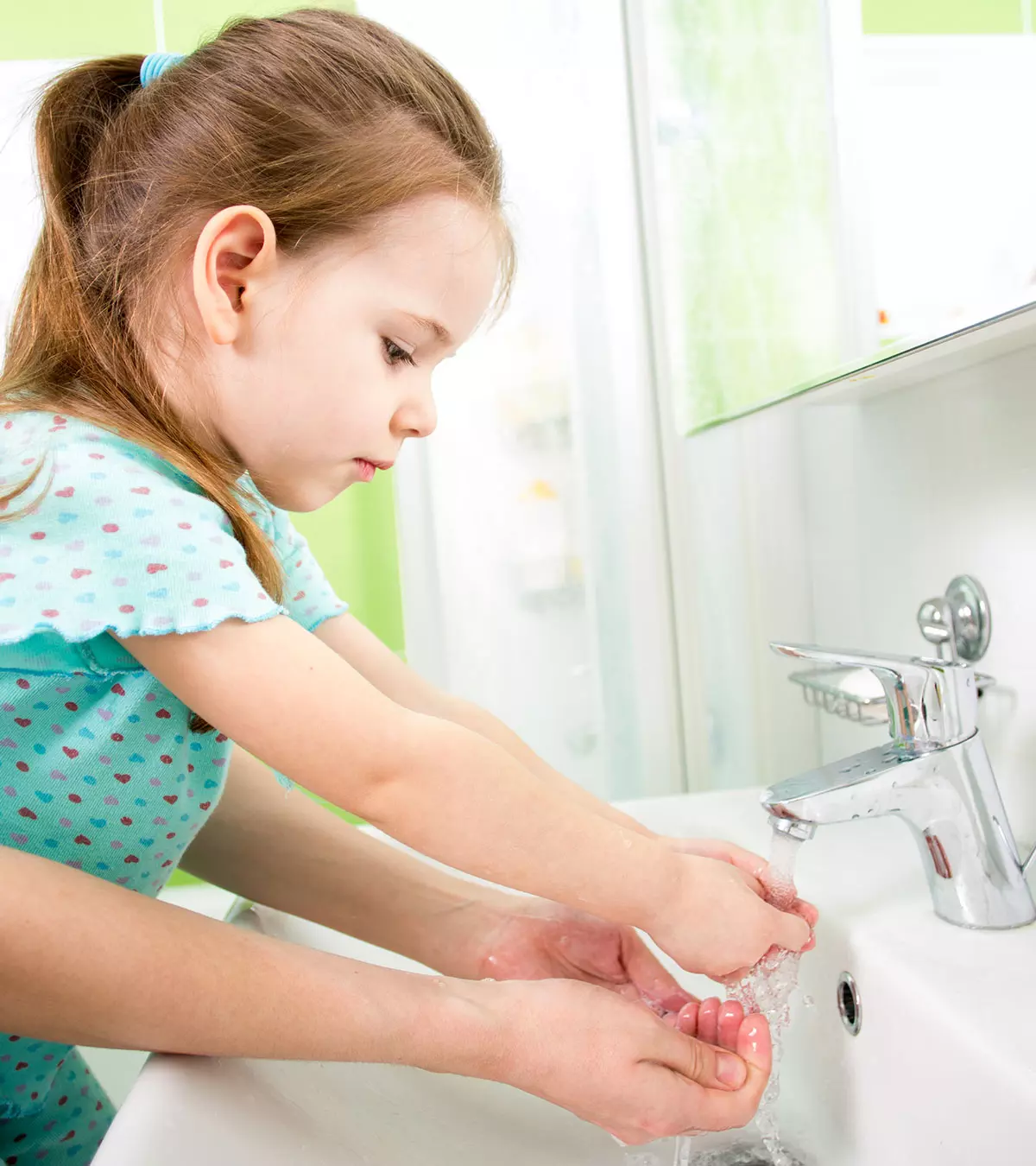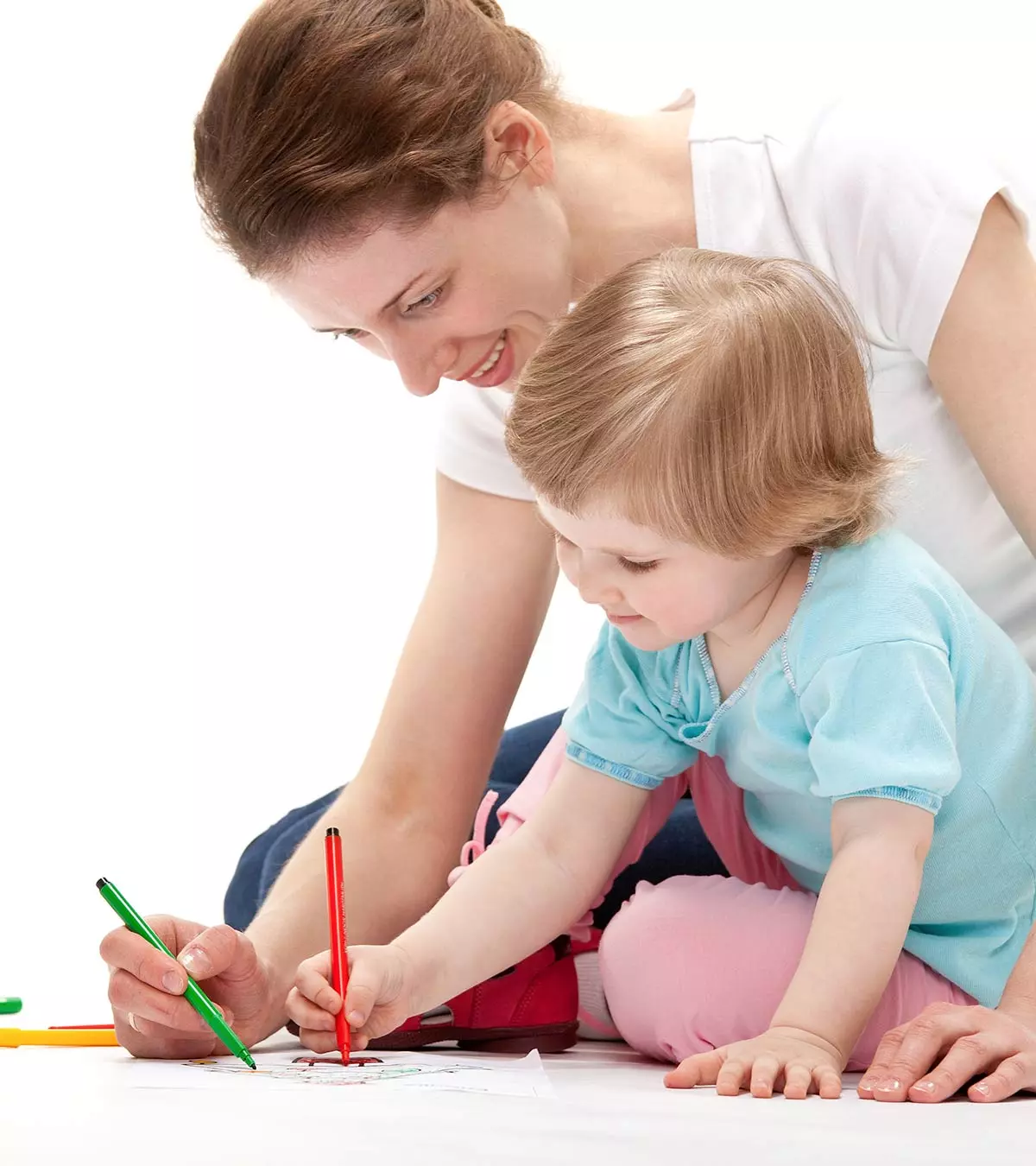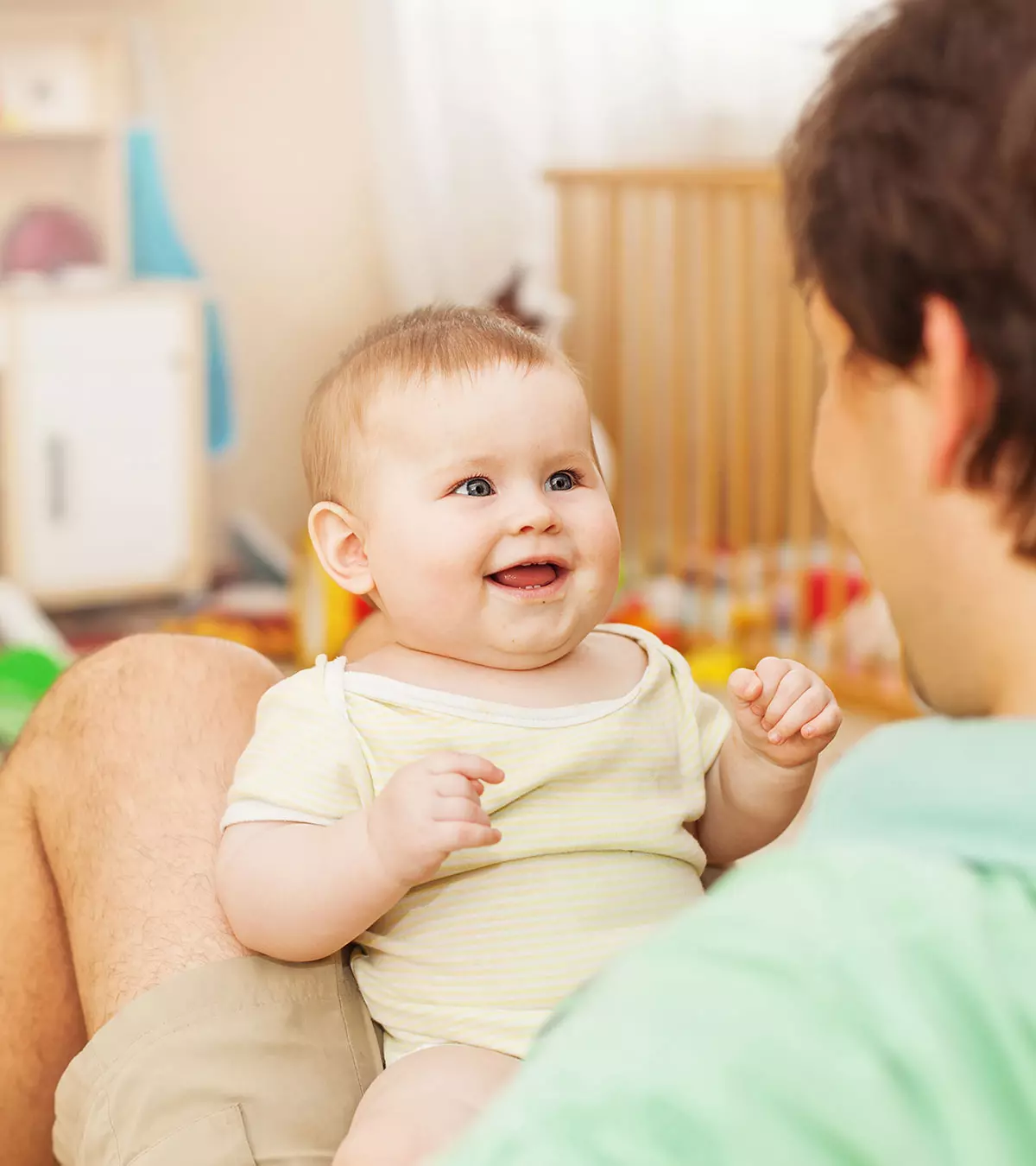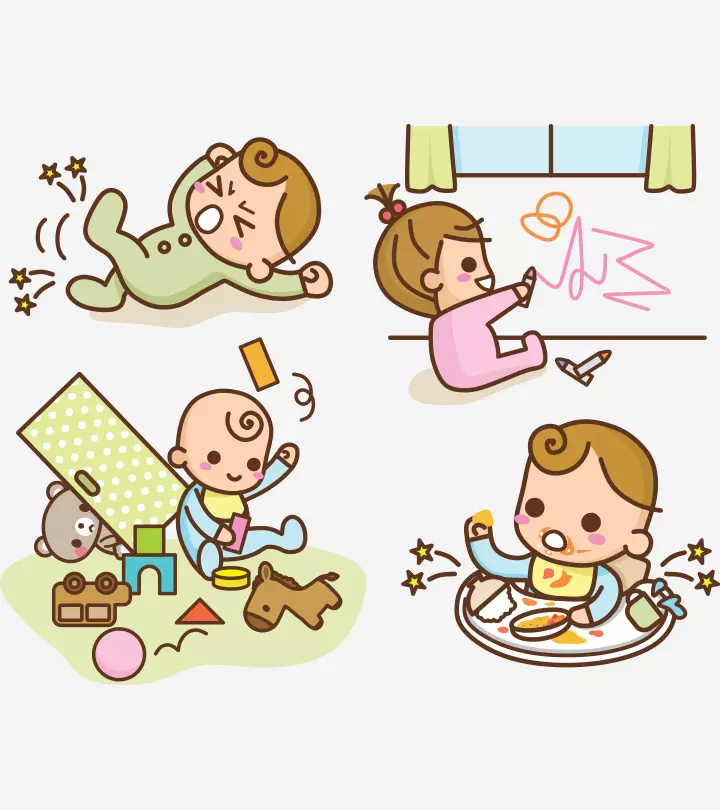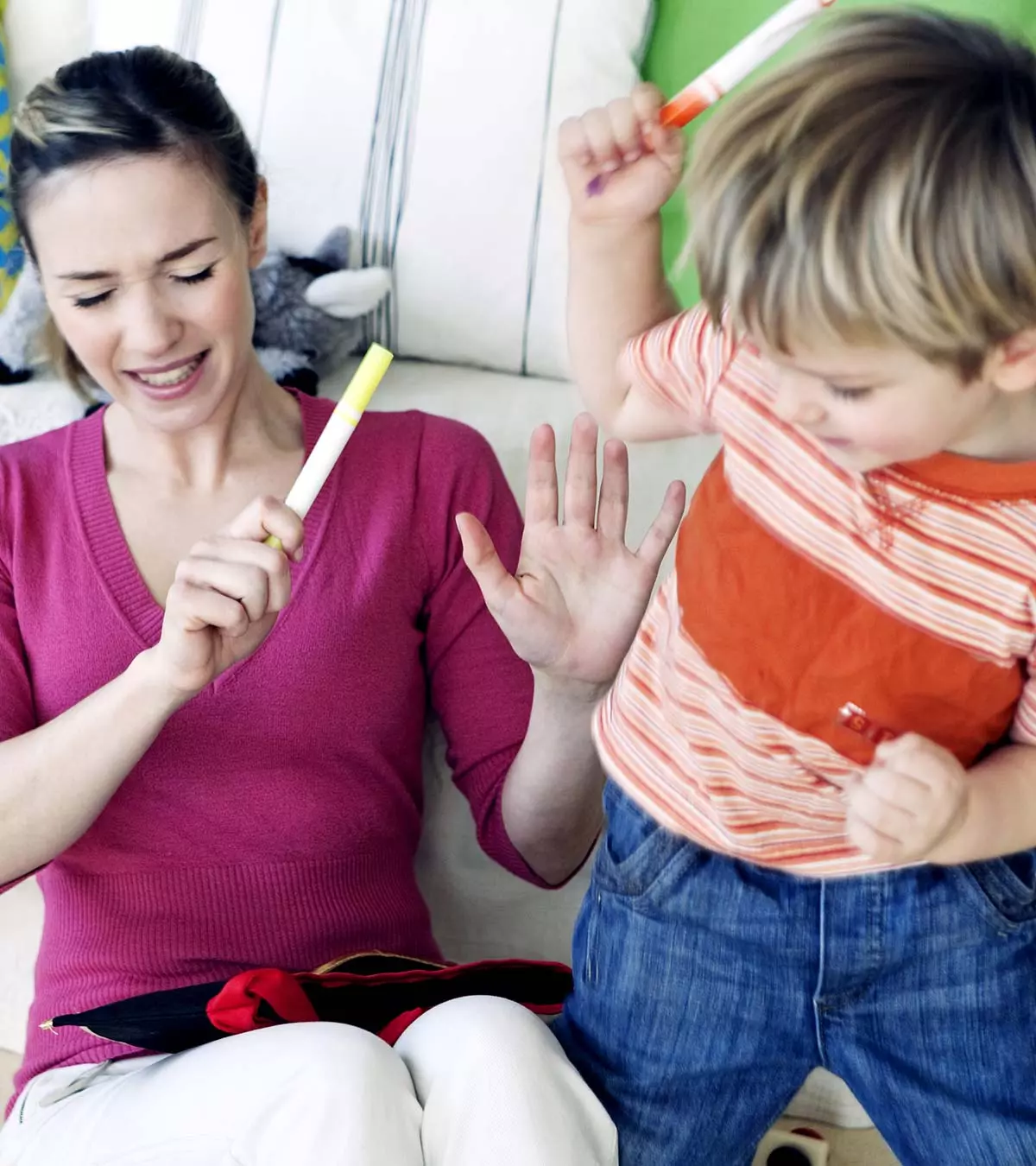
Image: Shutterstock
Children of all ages typically have a lot of energy, which parents can handle. But if the child is excessively energetic, you may wonder about ways to handle hyperactive children. Hyperactive children are restless and have trouble listening, receiving commands, or following instructions or directions. If you have a hyperactive child, managing them can be challenging and stressful at times.

Although a hyperactive child may look unsteady, with endless energy and a propensity for hopping from one activity to the next, restoring order to their life is not difficult. Patience can be considered a major attribute in parents while dealing with these children.
In this post, we have put together efficient strategies for dealing with hyperactive children.
Key Pointers
- Restlessness and difficulty in sticking to tasks are common in hyperactive children.
- Productive tasks like physical activity and sports can help channel their energy.
- Positive reinforcement is effective in promoting good behavior.
- Seeking professional help is important if the situation becomes overwhelming.
- Patience and reassurance are key in supporting hyperactive children.
Is Hyperactivity Normal Among Children?
Yes, it is normal for children to have some degree of hyperactivity and restlessness (1). It can be considered a typical trait of childhood. It is only when the condition becomes persistent and interferes with vital tasks, such as schoolwork and social interactions, that it becomes a concern. In such cases, you may speak to a doctor or an expert specializing in child behavior problems and solutions since intense and persistent hyperactivity may be a sign of ADHD (Attention Deficit Hyperactivity Disorder).
What Causes Hyperactivity In Children?
Occasional hyperactivity and hyperactivity during certain scenarios, such as during play or social interactions with other children, may often be a normal outcome of the situation in which the child finds themselves. It is seldom a problem, and it may not be pertinent to pursue the underlying cause. However, hyperactivity due to diagnosed ADHD could be a concern. While there is no specific cause for ADHD, the following factors may lead to it (2).
- Genetic or hereditary anomalies
- Low level of activity in the part of the brain that controls attention and activity levels among children
- Premature birth or head injuries, in some cases
Hyperactivity can be managed with support from parents and teachers.
20 Effective Ways To Handle Hyperactive Children
Creating a nurturing environment and taking certain steps are crucial for helping hyperactive children thrive. By implementing the following strategies, you can help your child manage their condition better and support their emotional well-being.
1. Establish order at home
While some households have their bunch of rules, many others are rather relaxed. This laid back style of parenting can sometimes work, but at most times, it fails with hyperactive kids. Hyperactive children need clear direction and a pattern to follow. If you have a hyperactive child, it is time you laid out some rules for the general functioning of the household. Not only will these rules help you run your household in a more clear and orderly manner, but they will also help your child understand what is expected of them and when.
Set a time to wake up, brush teeth, eat food, homework, play, and even sleep. This will reduce the chaos in the mind of a young child who does not know what to do. When their time is more structured, they will feel less anxious and perform better with clear consistency at both school and home. Ensure the rules are clear and consistent (3).
2. Choose your battles wisely
Do not battle everything your child does. And remember, a hyperactive child is in no way a bad child. Hyperactivity is a psychological disorder, also called ADHD (Attention Deficit Hyperactivity Disorder). This is something that your child has acquired just like any other disorder. Children suffering from ADHD find it hard to focus on a given activity and tend to jump from one thing to another. This happens when the brain chemistry is impacted, and the brain cells struggle to pass information between each other. Yelling at a child with ADHD will do more harm than good as your child will struggle to understand why you are yelling at them and only get more anxious. Instead, understand that they need your help even in day to day activities. Try to focus on things that are important and let other matters slide. If they are losing focus, remind them calmly (4).
For example, focus on helping your child get past important tasks like getting ready for school, eating his food and doing his homework. Remember, you need to take small steps with a child with ADHD.
Jerikho Jordan, a writer and music teacher, recounts her experience with a hyperactive child during piano lessons. She says, “I remember saying no and stop doing that a lot to a student constantly moving around after over five hours of teaching before his class. I got more agitated, and the boy’s attention span lessened. My negative tone wasn’t stopping him from crawling on the floor and playing the piano while standing. Instead, he was discouraged from doing anything at all.
“So the following week, I let him play the piano freely. It didn’t matter to me even if he played with the posture of a T-Rex as long as he was able to learn. I realized he was more cooperative in class when he could move freely without being constantly denied (i).”
 Point to consider
Point to consider3. Break down complex instructions
It can get very difficult for a child with ADHD to understand and put complex instructions into practice. Understanding becomes easier when you break down the simple task into even smaller chunks.
Teach your child to look you in the eye when you are trying to explain things to them. This will help them focus on what you are saying. Break the information into easy to digest chunks, and repeat it a few times if you have to. Once you are convinced that your child has understood the instructions, you can have them repeat each step. Do not get impatient or hurry with your child, as they will sense your impatience and get more anxious (5).
You can also write down instructions for an older child who can read. Step to step instructions pinned up to the refrigerator or the board in their room will help your child focus on each step and follow them one by one. They can also refer to the list and cross the steps as they complete them. Be sure to reward your child when they get it right. This will motivate them to do better the next time round.
4. Minimize the distractions
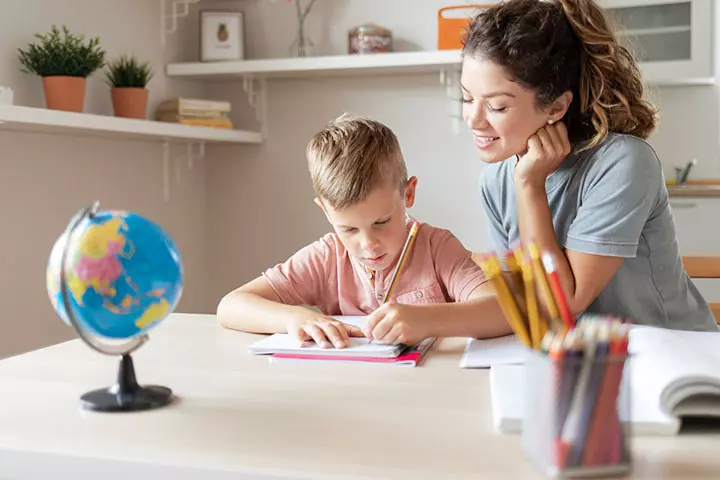
Small things that you may not even notice can distract and bother a child with ADHD. Thus, it is important that you set the right atmosphere, especially when your child is performing important tasks like doing homework or preparing for a test. Begin with seating your child in a location that is cozy and away from windows and doors. Do not restrain them to their seat as this can make them restless. But, reducing the distractions around will help them focus (5).
It is important that you create a warm and inviting workspace. Throw in their favorite chair and maybe their car on the desk, so they like the place they have to work. Make sure that they understand that homework and studies are not punishment. Take your child’s help while designing his study space to make them more comfortable and help them concentrate better. You may try to avoid music and TV in the household.
 Quick tip
Quick tip5. Utilize positive reinforcement
Completing a task at hand is no less than a huge struggle for a hyperactive child. You may need to reward your child and praise them every time they finish their work with or without your assistance. Start by giving them assistance and slowly reduce the extent of help you render. You can also let your child reward themself, for example, they can reward themselves with half an hour of TV time or play time if they complete the task at hand.
While bribing a child to participate can become habitual with normal kids, it helps to bribe a child with ADHD. Positive reinforcement, small rewards, hugs, a pat on the back, etc., will help your child through the struggle of task completion (6).
6. Help your child create simple to-do lists
Create a list of responsibilities they can handle to help the child build independence. Give them a written list of what they can do. It can be something as simple as filling up bottles or clearing up the table after dinner. The list can be made with diagrams that are attractive and will act as a visual reference to your child when they either forgets or gets distracted on what they should be doing. Instruct your child to refer to this list when they begin to feel bored or are unsure about what they should be doing. This will help your child feel important and responsible for certain chores around the house. Rewards for a job well done will help greatly (7).
Try not to punish or lose your temper if your child fails to follow the list. Remember your progress can be staggering in the beginning, but with patience and positive reinforcement, you will get past this one too! Allowing your child to work through the tasks in any order rather than starting from the top and working down the list, can make the entire exercise less forbidding.
7. Make way for unstructured time
Your child too needs to run around and simply play for his overall development. Your child is like any other child, so it is important that you allow them to play, run and jump or do what they feel like without restraining them too much. Try not to make your child’s schedule overly ordered and do not decide for them on what they should be playing. Allow your child to play outside daily while keeping an eye from a distance. This will help your child vent his energies and feel more in control of his moods. Unstructured time will also help your child become independent (8).
8. Advocate for your child

You know your child best, so you make an expert. With the cooperation and support from family and friends, develop a plan that incorporates others’ expertise with your own judgment that will help motivate your child better.
You can also discuss the situation well in advance with people who spend considerable time with your child. Like, for example, your babysitter can be brought up to date about the situation and the ways you are currently handling your child. This can also be discussed with your child’s teacher so that she can help your child in a more adept manner (9).
9. Read more
The more you know, the more equipped you will be in handling your child’s disorders. Read up and learn as much as you can about your child’s condition. Read handouts and informational material and scour trustworthy sites on the internet to learn more about ADHD (10).
Discuss your discoveries with your doctor before you implement them. Do not feel obligated to discuss your plan of action. Feel free to seek a second or third opinion. To maximize your child’s success, it is important that you advocate for them with not just professionals and experts but also the other people that your child interacts with.
 Quick tip
Quick tip10. Consult your physician
Though it is helpful and quite pacifying to equip yourself with tips to handle your child, feel free to consult your physician when you do not know what to do. Also, consult your doctor before changing a set routine.
11. Accept your child’s limitations and potential
Hyperactivity is in no way intentional, and your child does not intend to hurt you or irritate you. It is also important for you to understand that undue criticism can have a negative effect on your child’s progress. Hyperactivity can be kept under reasonable control. Show empathy towards your child to acknowledge that you support and understand their concern without being judgmental. Learn to understand and acknowledge the fact that your child is hyperactive, and hence, impose things that are within their limits.
12. Provide new outlets to vent

Make some time to take your child to the outdoors. Let them indulge in activities like running, sports and walks. If you have a yard, allow your child to go out to play every evening. In bad weather, you can allow them to use a large room to run around and play and do what they please without being criticized. If you have no room in your house for your child to play, clear up the garage. Allow the redirection of your child’s energy through physical activities that will help them.
13. Avoid fatigue
Children with ADHD sometimes struggle to communicate what they feel and need. It, therefore, falls upon you to watch over what your child does and do not allow them to get too tired. Your child becomes too tired or exhausted, their self-control will break down, and they will become all the more hard to handle. Exercise some amount of caution and lay down the boundaries subtly. Fix a time for play and urge your child to be back home, once the time is up (12).
14. Avoid large gatherings
If your child suffers from severe ADHD symptoms, try and avoid taking them to settings where they may feel uncomfortable. Churches and formal gatherings where people are forced to follow a certain decorum can be difficult for a young child who is hyperactive. Till you have been able to find ways to handle your child’s hyperactiveness in an easy way, forgo trips to the supermarkets, churches or large parties where you expect your child to behave and cause unnecessary friction between you and your child. This does not mean that you and your child need to be cooped up indoors always. Take it slow and gradually introduce your child to new settings as they develop self-control at home (12).
15. Maintain discipline
Children with ADHD need more careful and planned discipline than the average child. Rules need to be formulated and exercised in a subtle manner. You will also need to make these rules keeping your child and other children at home in mind
Maintain common rules for the entire household that are clear and easy to comprehend. Avoid using negativity even in words.
16. Reinforce discipline through nonphysical punishment
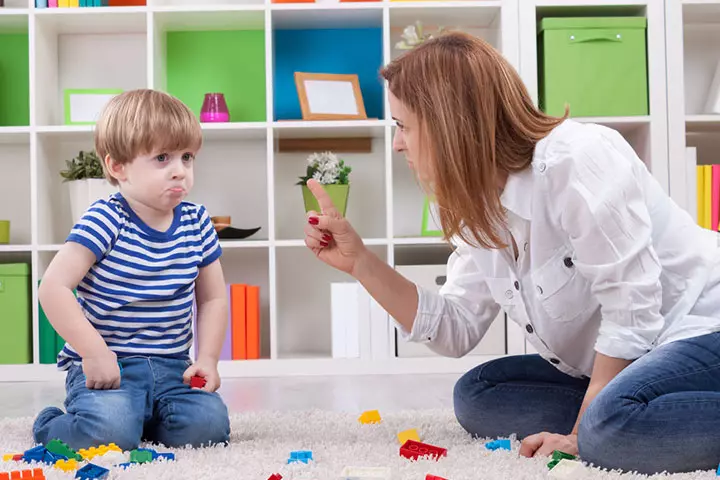
You may lose your calm if your child doesn’t pay heed to your instructions. In such cases, abstain from using harsh punishments as it may only make them more anxious. Instead give them time-outs if they misbehave. Have a meaningful conversation and express your concerns. Be stringent with your words and ensure you let them know that misbehavior would not be tolerated. Be their role model and enact the behavior you wish to see in your child (4).
17. Improve your child’s attention span
Make sure you reward non-hyperactive behavior. This is the key to preparing your child for social interaction and school. You can also begin teaching your child how to be persistent at what they do and thereby increase his attention span and creativity. Show your child pictures in a book. If you find that they are attentive, give them a big hug and tell them why you did it. Coloring pages, listening to a story and attempting to repeat it also can be rewarded.
Another novel way to improve your child’s attention span is to introduce them to games of increasing difficulty. Matching pictures, simple card games and even building blocks can help improve your child’s memory and attention span. Introduce them to one new game at a time and avoid giving him too many games that can distract him. Try and give unbreakable toys that are safe to play with, as aggression in kids is a noted symptom of ADHD and they may end up hurting themselves or others.
Start the tasks immediately after giving them instructions and keep activities to a minimum. Try to get back to the task if their attention deviates (11).
18. Buffer your child
Acceptance goes a long way in helping kids who are hyperactive. When your child feels accepted, their self-esteem and confidence will grow. Clear communication with your child becomes necessary when you notice they feel lost. Let the whole family and the concerned individuals in their lives know and be a part of their progress.
19. Take a break

You are a parent and not a superhero. Self-care for the caregiver and proper rest is a must to remain healthy and active. Take a break when you have to. Take turns with your partner in taking care of a hyperactive child. Even the most patient of parents can have a nervous breakdown with a hyperactive child. Have a babysitter take care of your child once a week and head out to the movies, or have a drink together. Rejuvenate yourselves and give yourself the break you deserve. It is when you are calm and composed that you can handle your child better (3).
20. Do not be hasty with medication
While getting your hyperactive child a prescription may seem the easiest thing to do as a remedial problem-solving measure, do not be too hasty. Yes, certain medications (if necessary) for hyperactive children do help in balancing out the brain chemistry and help many children with ADHD. It is also true that these medications have side effects and should not be made a habit. In many cases, behavior modification and therapy (if necessary) help greatly. Also never give medications without a doctor’s permission and only administer the recommended dosage.
Frequently Asked Questions
1. What are the signs of a hyperactive child?
The following are the signs of hyperactivity in children (12):
- Inability to sit still in one place
- Excessive talkativeness
- Lack of calm demeanor and extreme fidgetiness
- Inability to wait for their turn
- Little or no sense of danger
- Inability to concentrate on tasks
- Constant physical movement
- Impulsiveness
- Tendency to interrupt all conversations
2. What leads to hyperactivity in children?
Emotional stress, family stress, behavioral and mental health problems, genetic issues, specific health problems such as Grave’s disease, lack of exercise, and lack of sleep may lead to hyperactivity in children (13) (14).
3. What foods can cause hyperactivity?
Sugary foods, artificial sweeteners, and specific food colors may lead to increased hyperactivity in children (15).
4. What activity is good for my hyperactive child?
Listening to music could be a good activity for your child as it helps in improving brain function (16). If your child is interested in dance, arts, and crafts, try inculcating that into their routine too. In case your child is also diagnosed with ADHD, there are numerous activities for kids with ADHD that you can try out.
Parents are often concerned about hyperactive children at home because it is challenging to control them and match up to their energy. If you are also struggling with such a situation, you may learn unique ways to handle hyperactive children. These children often do well when given a set of rules to follow, praised immensely for small achievements, and allowed to rest before they become too exhausted. You may help your hyperactive child by giving them simpler instructions or providing them with a calm environment with fewer distractions. If you cannot manage them even after using different strategies, don’t hesitate to seek professional help.
Infographic: Techniques To Cope With Hyperactive Children
Hyperactive children are always brimming with energy. They often face challenges in following directions or instructions. But they don’t need to become a source of stress. You can still deal with them and make them more attentive and focused. Use the tips in the infographic below to handle them easily.
Some thing wrong with infographic shortcode. please verify shortcode syntax
Illustration: Effective Ways To Handle Hyperactive Children
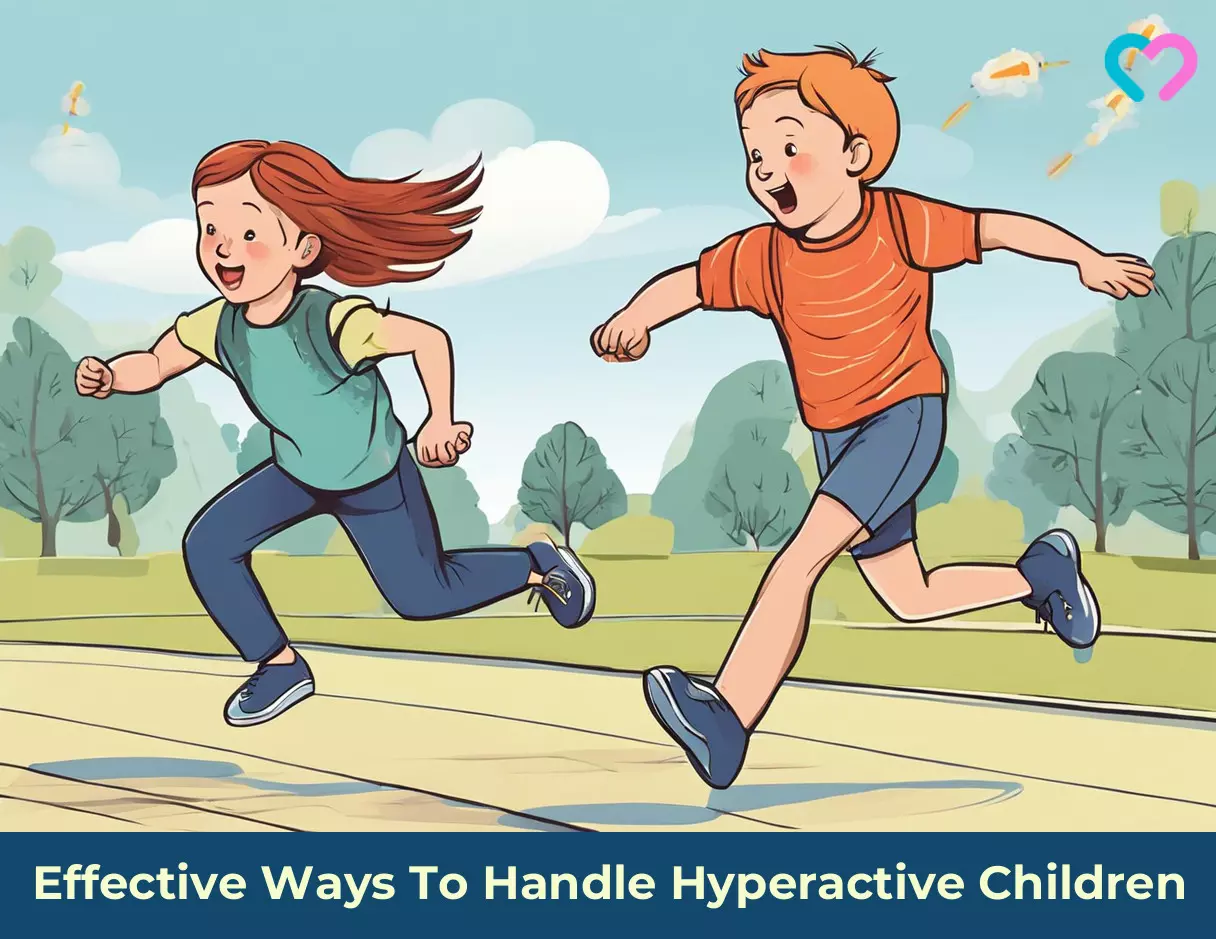
Image: Stable Diffusion/MomJunction Design Team
Personal Experience: Source
MomJunction articles include first-hand experiences to provide you with better insights through real-life narratives. Here are the sources of personal accounts referenced in this article.
i. 4 best ways to teach piano to children with ADHD.https://medium.com/age-of-awareness/4-best-ways-to-teach-piano-to-children-with-adhd-2a110c190f86
References
- Focusing on ADHD.
https://newsinhealth.nih.gov/2014/09/focusing-adhd - Causes of ADHD: What We Know Today
https://www.healthychildren.org/English/health-issues/conditions/adhd/Pages/Causes-of-ADHD.aspx - ADHD parenting tips.
https://www.helpguide.org/mental-health/adhd/parenting-child-with-adhd - ADHD and behavior problems.
https://childmind.org/article/adhd-behavior-problems/#:~:text=Children%20with%20ADHD%20can%20be - ADHD and school.
https://www.helpguide.org/mental-health/adhd/adhd-and-school - 5 effective positive reinforcement tips for your child with ADHD.
https://chadd.org/adhd-weekly/5-effective-positive-reinforcement-tips-for-your-child-with-adhd/#:~:text=The%20authors%20shared%20their%20top - Time management and ADHD: to-do lists.
https://chadd.org/for-adults/time-management-and-adhd-to-do-lists/ - Less-structured time in children’s daily lives predicts self-directed executive functioning
https://www.ncbi.nlm.nih.gov/pmc/articles/PMC4060299/ - Being an effective advocate for your child.
https://childmind.org/article/being-an-effective-advocate-for-your-child/ - Living with attention deficit hyperactivity disorder (ADHD).
https://www.nhs.uk/conditions/attention-deficit-hyperactivity-disorder-adhd/living-with/ - 6 simple ways to help your child focus.
https://www.understood.org/en/articles/how-to-improve-focus-in-kids - Symptoms; Attention deficit hyperactivity disorder (ADHD)
https://www.nhs.uk/conditions/attention-deficit-hyperactivity-disorder-adhd/symptoms/ - Graves’ Disease
https://www.chop.edu/conditions-diseases/graves-disease - Stress in childhood
https://medlineplus.gov/ency/article/002059.htm - Hyperactivity and sugar
https://medlineplus.gov/ency/article/002426.htm - Musical benefits
https://www.learningpotential.gov.au/articles/musical-benefits
Community Experiences
Join the conversation and become a part of our nurturing community! Share your stories, experiences, and insights to connect with fellow parents.
Read full bio of Dr. Sadhvi Mythili
Read full bio of Harshita Makvana
Read full bio of Dr. Joyani Das






